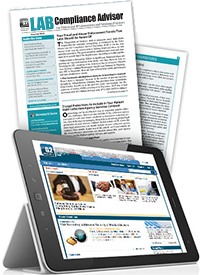What to Do If Stark Is Keeping You from Providing Emergency COVID-19 Testing
Scenario: A local physician group wants to team up with your lab to provide COVID-19 testing for its Medicare, Medicaid and private pay patients. Although the deal would also be lucrative, the primary attraction is its potential benefits to public health and COVID-19 containment. But there’s a serious compliance snag: The operating general partner of the physician group is part of the company that owns your lab. As a result, even though it would help deliver much needed COVID-19 testing to your community, you can’t enter into the arrangement because you’d be violating the Stark Law. Right? Yes and no. Yes, the part about entering into a referral arrangement with a physician that has financial ties to your lab being a potential Stark violation is correct; however, the conclusion that you can’t do the deal isn’t necessarily true. Explanation: Because COVID-19 has been declared a public health emergency (PHE), you may be able to get a waiver allowing you to make the otherwise problematic COVID-19 testing arrangement. When Laws Collide: Stark v. PHSA On Jan. 31, 2020, the U.S. Department of Health and Human Services declared a PHE to deal with the COVID-19 pandemic. The action has legal consequences that […]

Scenario: A local physician group wants to team up with your lab to provide COVID-19 testing for its Medicare, Medicaid and private pay patients. Although the deal would also be lucrative, the primary attraction is its potential benefits to public health and COVID-19 containment. But there’s a serious compliance snag: The operating general partner of the physician group is part of the company that owns your lab. As a result, even though it would help deliver much needed COVID-19 testing to your community, you can’t enter into the arrangement because you’d be violating the Stark Law.
Right?
Yes and no. Yes, the part about entering into a referral arrangement with a physician that has financial ties to your lab being a potential Stark violation is correct; however, the conclusion that you can’t do the deal isn’t necessarily true. Explanation: Because COVID-19 has been declared a public health emergency (PHE), you may be able to get a waiver allowing you to make the otherwise problematic COVID-19 testing arrangement.
When Laws Collide: Stark v. PHSA
On Jan. 31, 2020, the U.S. Department of Health and Human Services declared a PHE to deal with the COVID-19 pandemic. The action has legal consequences that providers may not be familiar with. One of them is the opportunity to secure temporary relief from Stark to provide COVID-19 testing. Here’s the breakdown:
The Stark Law bans physicians from referring Medicare or Medicaid patients to labs or other health care entities with which they or an immediate family member have a financial relationship. Ensuring adherence to Stark restrictions when dealing with referring physicians is an everyday and pressing imperative for labs and their compliance managers.
The PHSA: But there’s another law that may come into play, namely, the Public Health Service Act, which empowers the HHS Secretary to declare a PHE. While it may feel like public relations, the reason the Secretary made such a declaration was to activate his powers to take broad response measures to deal with COVID-19 and protect the public, which may include setting aside the normal rules of health care fraud and compliance in the interest of serving the immediate health needs of the public. More precisely, while a declared PHE is in effect, HHS may waive or modify Medicare, Medicaid, State Children’s Health Insurance Program and HIPAA requirements under Section 1135 of the Social Security Act (SSA), including:
- Stark Law restrictions;
- Conditions of participation;
- The need of preapproval for medical items or services; and
- Restrictions on telemedicine.
And for COVID-19, no public health need is more pressing right now than the need to deliver diagnostic testing. So, to the extent that Stark is standing in the way of that testing, it can be temporarily set aside.
Section 1135 Waivers
But Stark relief is not automatic. You must apply to CMS for and get a Section 1135 waiver before entering into COVID-19 testing arrangements with referral sources that may run afoul of Stark. and you need to get a waiver.
CMS reviews each Section 1135 waiver application on a case by case basis. If it’s granted, the waiver can take effective retroactively to the start of the emergency period or to any other subsequent date CMS determines. The waiver ends upon termination of the PHE or 60 days after the waiver or modification is first published. If the PHE is still in effect after 60 days, it can be renewed for additional 60-day periods.
Takeaway
During the current COVID-19 emergency, labs need to recognize that they may have additional latitude to enter into temporary arrangements with physicians to promote public health. More precisely, seeking a Section 1135 waiver may make a lot of sense if your lab has an opportunity to provide coronavirus testing or other related services for Medicare or Medicaid beneficiaries in collaboration with a physician or medical group that has ownership interests in or other financial ties to your lab that would normally be prohibited under the Stark Law.
Subscribe to view Essential
Start a Free Trial for immediate access to this article


